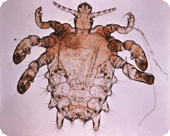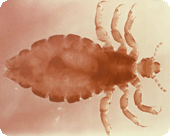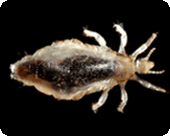Lice are parasitic insects that can be found on people's heads, and bodies, including the pubic area. Human lice survive by feeding on human blood. Lice found on each area of the body are different from each other. The three types of lice that live on humans are:
- Pediculus humanus capitis (head louse),
- Pediculus humanus corporis (body louse, clothes louse), and
- Pthirus pubis ("crab" louse, pubic louse).
Only the body louse is known to spread disease.
Lice infestations (pediculosis and pthiriasis) are spread most commonly by close person-to-person contact. Dogs, cats, and other pets do not play a role in the transmission of human lice. Lice move by crawling; they cannot hop or fly. Both over-the-counter and prescription medications are available for treatment of lice infestations.
Pubic "Crab" Lice

Adult pubic lice are 1.1-1.8 mm in length. Pubic lice typically are found attached to hair in the pubic area but sometimes are found on coarse hair elsewhere on the body (for example, eyebrows, eyelashes, beard, mustache, chest, armpits, etc.).
Contact Us:
- Centers for Disease Control and Prevention
1600 Clifton Rd
Atlanta, GA 30333 -
1-800-CDC-INFO
(800-232-4636)
TTY: (888) 232-6348
New Hours of Operation
8am-8pm EST/Monday-Friday
Closed Holidays - cdcinfo@cdc.gov




